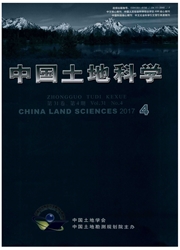

 中文摘要:
中文摘要:
研究目的:从农民对农地整理项目的需求出发,对农地整理项目立项决策进行评价。研究方法:基于熵权改进的TOPSIS法。研究结果:(1)当前影响农业生产的主要因素有自然灾害、农业基础设施以及耕地资源禀赋,因此从以上三个方面构建了基于农民视角的农地整理项目立项决策评价指标体系,进而考察了农民对农地整理项目需求的紧迫度;(2)实证分析结果显示,从农民的角度来看,湖北省农地整治立项优先顺序应为:孝南区肖港项目、随县新街项目、潜江市浩口项目、随县安居项目、孝南区陡岗项目和潜江市熊口项目;(3)基于农民视角的农地整理项目立项决策评价结果反映了目前农民对农地整理项目需求的实际要求,但与当前政府主导的农地整理项目立项决策评价结果不完全一致。研究结论:农民是农地整理的核心利益相关者和最终受益者,从农民的视角对农地整理项目立项决策进行评价,更符合农民的利益需求,因此,农民对农地整理项目需求的紧迫度越高的项目原则上应予以优先立项。
 英文摘要:
英文摘要:
The purpose of this study is to evaluate the decision-making of rural land consolidation(RLC)project approval based on farmers' demand for RLC project. The improved TOPSIS method based on entropy weight was employed. The results indicated that nature disasters, agricultural infrastructure and cultivated land resource endowment were the main factors that affected agricultural production. Therefore the paper built the evaluation indicator system for decision-making of RLC project approval based on farmers' perspective from these three aspects, and then investigated the degrees of farmers' demand for RLC project. Empirical analysis results showed that the prior rural land consolidation projects in Hubei Province based on farmers' perspective should follow the sequences, such as Xiaogang project in Xiaonan District, Xinjie project in Sui County, Haokou project in Qianjiang City, Anju project in Sui County, Dougang project in Xiaonan District, and Xiongkou project in Qianjiang City. The decision-making evaluation results of RLC project approval based on farmers' perspective reflected the actual requirements of farmers' demand for RLC project, but it did not conform to the current government-led decision-making evaluation results of RLC project approval. It is concluded that farmers are the core stakeholders and the ultimate beneficiaries of RLC project. The evaluation of RLC project approval based on farmers' perspective is more in line with the interests of farmers. The higher degree of farmers' demand for RLC project should be selected as priorer projects in principle.
 同期刊论文项目
同期刊论文项目
 同项目期刊论文
同项目期刊论文
 期刊信息
期刊信息
